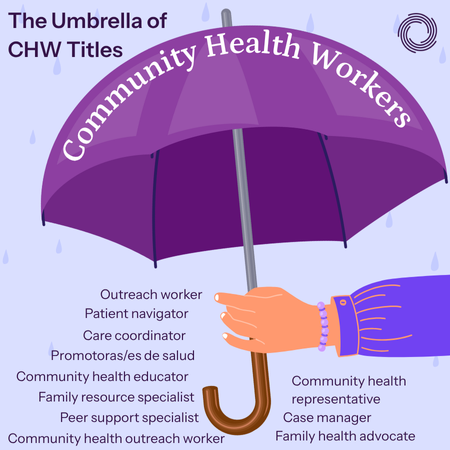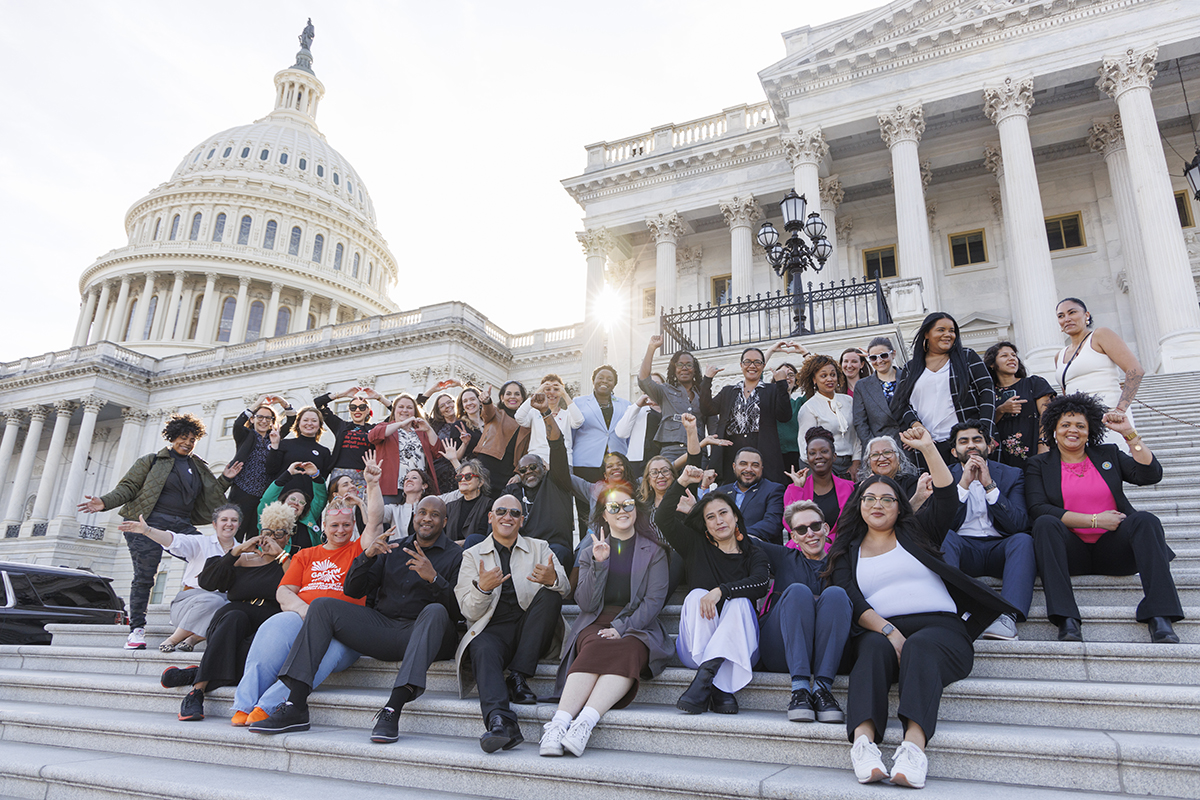Community Health Workers (CHWs) are trusted individuals who understand the people, culture, language, and challenges in their communities. As frontline public health professionals, CHWs have strong community ties and serve as bridge builders. They bring lived experience and specialized training to address the gaps between health and social services and the communities they serve.
A community health worker is a frontline public health worker who is a trusted member of and/or has an unusually close understanding of the community served. This trusting relationship enables the worker to serve as a liaison/link/intermediary between health/social services and the community to facilitate access to services and improve the quality and cultural competence of service delivery. A community health worker also builds individual and community capacity by increasing health knowledge and self-sufficiency through a range of activities such as outreach, community education, informal counseling, social support, and advocacy. (American Public Health Association, 2009)
Whether known as promotoras/es, patient navigators, community health representatives, or outreach specialists (Figure 1), CHWs play an essential role in helping underserved and marginalized populations access services, navigate complex systems, and organize for change. And their impact extends beyond individual support. By addressing root causes of health inequities and fostering resilience, CHWs improve outcomes at both individual and population levels.

Sustaining the CHW Workforce
Research consistently shows that CHWs improve chronic disease management, reduce hospitalizations, and lower healthcare costs, delivering a strong return on investment. Their effectiveness spans mental health, asthma, cancer, diabetes, and more. Despite this evidence, CHWs face persistent workforce challenges: low pay, limited career growth, insufficient support, and unstable funding.
The precarious nature of the CHW role increases the risk of burnout. With limited decision-making power, frequent exposure to secondary trauma, and little separation between their professional and personal lives, CHWs must be supported by strong policies and systems to remain an effective and sustainable workforce. This means that health care administrators, policymakers, and other decision-makers must go beyond engagement and center CHW voices by listening to CHW leaders and allies who have long advocated for efforts such as:
- Protecting CHWs through equitable policies, fair compensation, and CHW-led evaluation practices that reflect their integral services.
- Respecting CHWs by valuing—and paying for—their lived experience, cultural knowledge, unique perspective, and the invaluable trust they build with communities.
- Partnering with CHWs to co-create a supportive infrastructure, including training, technology, transportation, supervision, and stable funding.
Together, these strategies can strengthen the CHW workforce and improve the health of communities nationwide.
Collaborating to Support CHWs
In addition to working in hospitals, health centers, and local agencies, CHWs have formed their own organizations. As of 2025, more than 60 CHW associations and networks span 38 states, alongside numerous training organizations.
Three of these organizations have strengthened their collaboration by becoming fiscal partners of Health Resources in Action (HRiA). Each is CHW-led, CHW-serving, and working both independently and collectively to elevate the field. They are:
- Community Health Worker Center for Research & Evaluation (CHW-CRE)
- Massachusetts Association of Community Health Workers (MACHW)
- National Association of Community Health Workers (NACHW)
These organizations share HRiA’s core beliefs and vision of healthy people thriving in equitable, just communities. By strategically aligning our efforts through partnership, we can more effectively transform health and social systems. The following section highlights examples of meaningful progress achieved by each organization.
Significant Accomplishments
Community Health Worker Center for Research & Evaluation (CHW-CRE)
Founded in 2023, CHW-CRE evolved from a 2015 initiative to align CHW evaluation metrics. It centers CHWs as leaders in research and evaluation, promoting best practices and the use of CHW Common Indicators. CHW-CRE is led by co-Executive Directors Victoria Adewumi and Noelle Wiggins. “CHWs are the true experts about their profession, including how it should be measured and evaluated,” Wiggins remarked. “At CHW-CRE, we advocate, educate, organize, and build capacity so CHWs can lead research and evaluation about the profession. Adewumi added, “By using measurement tools designed with and by CHWs, we champion the conditions CHWs need to do their lifesaving work in and for communities.”
Key Accomplishments:
Best Practices in Research and Evaluation: In 2025, CHW-CRE released “Creating a new table: Best practices in CHW research and evaluation,” a tool that empowers CHWs in research and guides non-CHW researchers in equitable evaluation of CHW programs.
CHW Common Indicators: CHW-CRE’s predecessor, the National CHW Common Indicators Project, developed 12 indicators to measure CHW outcomes and workforce sustainability. These are now used to evaluate CHW programs at the local, state, and national levels.
Massachusetts Association of Community Health Workers (MACHW)
Founded in 2000, MACHW was the first professional CHW organization in the U.S. It envisions a Commonwealth where CHWs are valued, integrated, and sustained as health professionals and leaders. MACHW became an HRiA fiscal partner in 2014 and is led by Executive Director Lissette Blondet. She commented, “MACHW represents over 6,000 community health workers across the Commonwealth who use their lived experience and learned skills to lift up and navigate neighbors toward healthier lives.”
Key Accomplishments:
- CHW Development: MACHW offers professional development, leadership training, and networking to help CHWs grow their skills and careers, making them even more valuable to their communities.
- State Policy Advocacy: MACHW co-sponsored bills H359 and S251 to standardize CHW practice, secure reimbursement, and include behavioral health as a core competency. In her 2023 testimony, Blondet boldly stated: “Strengthening the healthcare workforce pipeline is paramount in achieving health equity in Massachusetts.” (see full testimony)
National Association of Community Health Workers (NACHW)
Launched in 2019, NACHW unifies CHWs across geography, sector, ethnicity, and experience to advance health, equity, and social justice in their communities. “Community Health Workers are a vital driving force connecting communities to a health and wellness ecosystem,” said former NACHW interim Executive Director Katherine Martinez. “Through integration and self-advocacy, their impact on communities across the nation is both powerful and inspiring.”
Key Accomplishments:
- National Advocacy: In March 2025, NACHW and Partners in Health convened over 100 CHWs in Washington, D.C., for a two-day Capitol Hill event. NACHW provided training, toolkits, and resources via webinar to empower CHWs to advocate for their communities.
- Convening: In July 2025, NACHW hosted its UNITY Conference with over 800 CHWs and allies in Columbus, Ohio.
- Employer Best Practices: NACHW’s Workforce Development Committee released a 2025 report outlining promising practices for CHW employers. The report aims to improve retention, satisfaction, and service quality, with a focus on healthcare and CHW training organizations.
The Power of the Collective
Individually, these organizations advance the CHW field. Together, they form a powerful alliance rooted in shared purpose and community strength. With expertise in state advocacy, national leadership, and research, they amplify CHW voices, shape people-first policies, and build an equitable future where communities thrive. Their collaboration shows what’s possible when we invest in people, honor community wisdom, and move forward together.
Get Involved
Join the movement:
- Become a member of MACHW
- Subscribe to the NACHW newsletter
- Join CHW-CRE’s bilingual advisory group
- Track CHW legislation in your state
- Connect with your local CHW network
QUICK LINKS
